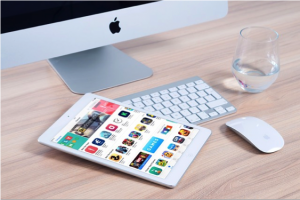 Many of the errands or tasks that once required us to leave the comfort of our homes, we’re now able to do online – at your kitchen table, on the couch, or in bed. Whether it’s shopping, DVD rentals, library checkouts, or license plate registration, tasks that used to require a paper and pen or a car ride can now be done electronically. One thing that has gone virtual that seems to raise some concerns among consumers is electronic banking. Managing your bank accounts from the web is still a frightening concept to some. In fact, according to the Federal Reserve, adults age 60 or older account for 24% of mobile phone users, but only 6% of mobile banking users. If you’d like to take advantage of the convenience of online banking, but fear for the confidentiality or safety of your finances, consider the following tips for safe online banking.
Many of the errands or tasks that once required us to leave the comfort of our homes, we’re now able to do online – at your kitchen table, on the couch, or in bed. Whether it’s shopping, DVD rentals, library checkouts, or license plate registration, tasks that used to require a paper and pen or a car ride can now be done electronically. One thing that has gone virtual that seems to raise some concerns among consumers is electronic banking. Managing your bank accounts from the web is still a frightening concept to some. In fact, according to the Federal Reserve, adults age 60 or older account for 24% of mobile phone users, but only 6% of mobile banking users. If you’d like to take advantage of the convenience of online banking, but fear for the confidentiality or safety of your finances, consider the following tips for safe online banking.
- Use strong passwords. This means using a combination of uppercase and lowercase letters, numbers and symbols if possible. Avoid the obvious choices, like your pet’s name, your birthday, or your street name. Also, do not use the same password for all of your accounts, and change them regularly.
- Only use reputable financial institution’s websites (or apps). Avoid clicking links sent by others that could be a fraudulent attempt to obtain your login information.
- Only bank on secure Wi-Fi. Don’t log in to your bank accounts online on public Wi-Fi, or only use secure sites that begin with HTTPS. More information can be found here.
- Always log out and close your browsers when finished. Also consider clearing your browser history. Ensure that your passwords are not saved, so that if someone accesses your device, they cannot log in to your bank account.
- Use discretion when utilizing third party programs that want to access your bank accounts. Many tools exist on the web that pull information from your bank accounts and use it to help you with money management. Some of these may be fine to use, but others may have limited security, opening your finances up to the risk of being accessed or even tampered with. If you plan to use one of these tools, be sure you do your homework to be certain that they are secure.
- Report a loss or a theft to your bank as soon as possible. If you used a laptop or mobile device for banking that is stolen, notify your financial institution right away. They may be able to monitor your account and inform you of any fraudulent activity, which is an added level of protection.
Finally and perhaps most importantly, don’t hesitate to ask your bank for information on security before you officially step into the world of online banking. Your bank or financial institution is very likely to have plenty of information on their security features, and they can provide you with the best preventative measures to take against a scam. Banks typically never ask for passwords, and your bank can confirm this for you. So, never give your login information to anyone.

